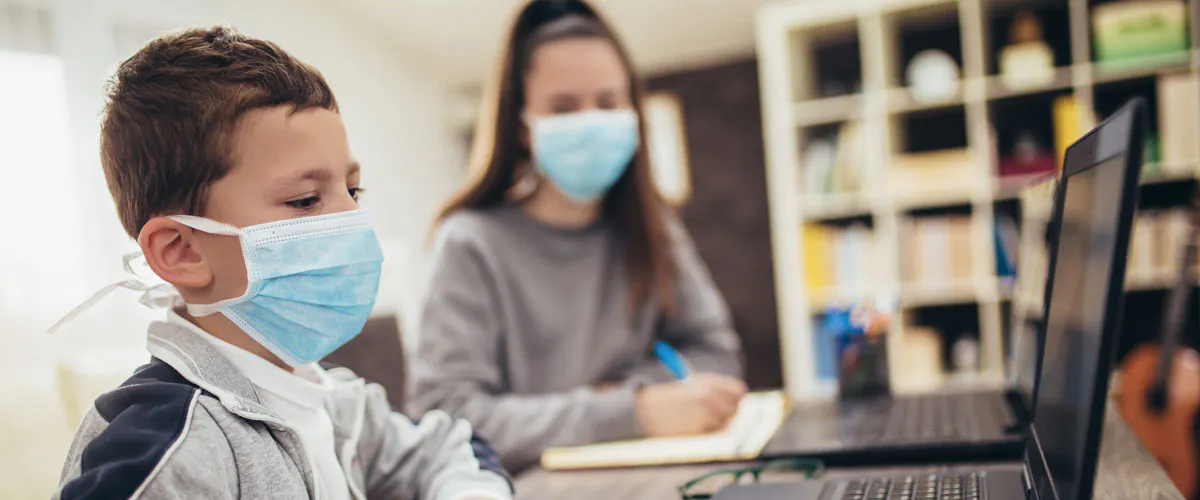Study to explore impact of COVID-19 on pre-K children's school readiness skills, recovery rates
Never before have children across the nation been out of school for as long as they have been now due to COVID-19. As a result, it may take years for students, especially younger children who are still adapting to formal schooling, to recover both academically and social-emotionally in the classroom.
To assess the long-term impact of COVID-19 on young students, researchers at the University of Georgia are investigating the rate at which prekindergarten children return to pre-pandemic levels of school readiness and whether the rate of recovery is similar across all children as they transition through kindergarten and first grade.
The study will also explore school and classroom practices that help explain these rates of recovery to better prepare teachers and school districts for future crises.
"Pre-K is a particularly vulnerable period for these prolonged absences," said Kristen Bub, associate professor in the Mary Frances Early College of Education's department of educational psychology and principal investigator of the study. "Young children are developing their trust of adults outside of the family. With COVID-19, they go to school one day, and then suddenly they never see their teacher in person again, resulting in a relationship that could be compromised."
Based on past research of the impact of natural disasters on children's day-to-day routines, including schooling, Bub expects certain developmental, behavioral and emotional milestones that children normally develop in pre-K to be severely impacted by COVID-19.
"We also expect—given the long period of time they were out of structured school settings and in-person instruction—that all of the academic, social and behavioral skills these children are learning will decline over this period," she said. "We expect these skills to be much lower than would be typical as children make the transition to kindergarten, and certainly lower than you would normally see for just a short summer break.
Additionally, children who already face personal or academic challenges may be at an even greater risk of experiencing more pronounced negative impacts to school readiness due to limited resources in their homes or other care environments.
"Research indicates children from homes with more constrained economic resources have a higher likelihood of lagging behind in academic, social, and/or behavioral skills because they might not have access to the supports they need at home. With the unexpected interruption of traditional school, that likelihood is going to be exacerbated," said Bub. "We think the recovery rate for those children is going to be quite long and that simply being back in a more structured educational environment is not necessarily going to eliminate the loss they experienced over that seven-month period away from the classroom."
Bub and Stacey Neuharth-Pritchett, associate dean of academic programs in the College of Education and co-principal investigator on the study, are working with all elementary schools in the Clarke County School District to collect data on children's academic skills (general knowledge of language and mathematics), social skills (ability to communicate, cooperate, and empathize with peers), behavior problems (engagement in bullying, hyperactivity/inattention, aggression) and relationship skills (teachers' perceived closeness, engagement and conflict with students).
COVID-19's disruption to schooling not only impacted students, but also teachers across the nation who were required to transition their lessons online. Based on initial responses to the study's online surveys, Bub found that many educators felt unprepared to implement and administer online teaching on such short notice.
As a result, the study will also assess what district-level practices and protocols were provided to teachers for distance learning as schools closed and as they re-open, as well as teachers' overall stress levels, their feelings of preparedness to transition to distance learning, their perceptions of district or school support, and more.
"We're hoping the results of this study are informative for the district to convey whether the practices they had in place were helpful to support young children's academic, social, behavioral, and relational outcomes," said Bub. "Additionally, we hope our research has multiple levels of implications, not just in providing an understanding of the impacts on child development, but really thinking through how we can better prepare for an event like this in the future."
The first of five rounds of data have been collected, and the researchers hope to use these initial results, combined with data collected in the fall after students return to school, to determine the impact of extended school shut-downs on students. Data will be gathered across two years, so the study will follow the same group of students from pre-K through first grade.
"We expect we're going to have some children who aren't going to regain all of their school readiness skills by first grade," she said. "This may be because some parents are going to be more hesitant to send their children back to school, and we expect we're going to see many more absences in the fall. Even if parents do send their children back to school, they might send them back infrequently, and we might see some children who don't come back until the spring. We don't know—this is an unprecedented event since we've never had children out of school for this long a period of time."
